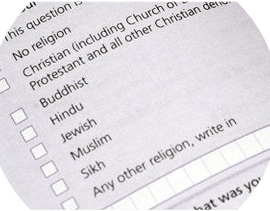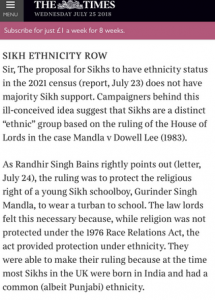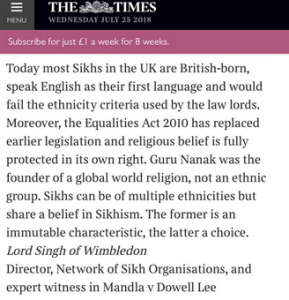 As many will know we have strenuously opposed the Sikh Federation UK’s (SFUK) ill conceived campaign to classify ‘Sikh’ as an ethnicity for many years.
As many will know we have strenuously opposed the Sikh Federation UK’s (SFUK) ill conceived campaign to classify ‘Sikh’ as an ethnicity for many years.
In recent months this increasingly divisive debate has become the subject of significant mainstream media coverage, including an article in the Times last month. The article ‘Sikhs may get ethnicity status’ instigated another flurry of debate and conversation for and against.
Meanwhile during this period, some exchanges on social media turned rather unpleasant, troubling and on occasion personal. Our Director responded to the Times article with a letter (below).


Lord Singh of Wimbledon CBE, D Lit., DL
An ethnic group relates to people emanating from a particular part of the world who have common physical and cultural characteristics. It became important to Sikhs in the early 80s because a School Head deliberately discriminated against a Sikh schoolboy in refusing to allow him to wear a turban at school. The Head was legally entitled to do this because the 1976 Race Relations Act, while giving protection against discrimination on grounds of nationality or ethnic origin, gave no protection against religious discrimination.
At a meeting held in my house with representatives of the then Commission for Racial Equality (CRE) and their solicitors Bindmans, I suggested that we should try claiming protection under ethnicity, as at that time, most Sikhs in the UK were born in India, spoke Punjabi as their first language and had other distinctive ways of life, including religion. Our case eventually went to the House of Lords giving Sikhs protection against religious discrimination under the 1976 Race Relations Act on the grounds of common ethnicity characteristics.
With most Sikhs in the UK now born in this country and speaking English as their first language, some of the arguments used in 1983, no longer apply. Nor are they relevant as the Equalities Act 2010, gives protection against discrimination to all religions and beliefs [the 1976 Act giving Sikhs limited protection under ethnicity, has been repealed].
Further stretching the meaning of ethnicity for material gain
Some Sikhs for two different reasons want to call themselves both a religion and an ethnic group, despite Sikh teachings to the contrary. The first reason is a somewhat naïve belief that the distinction might help Sikhs claim a separate identity and possible statehood in India. The second is, that being in both categories will assist in getting additional UK state funding over and above that given to other religions.
Leaving aside the morality of such an argument, common sense reminds us that we must compare like with like. A group which is both an ethnic group and religion must be monitored against others who are also both ethnic groups and religions. Such a category does not exist. Equally it would be absurd to try to monitor state provision for Sikhs as an ethnic category, with the existing ethnic category Indian, when the category Indian, also contains Sikhs.
The argument is also totally against Sikh teachings in which the Gurus condemned man made divisions of our one human family. To suggest a hybrid ‘(Punjabi) ethnic Sikh’ category in the census, in order to chase possible material gain denied to other faiths, is also totally contrary to the egalitarian thrust of a religion open to anyone anywhere in the world. It also defies common sense to suggest that those who embrace Sikhism and call themselves Sikhs in different parts of the world all have the same ethnicity.
Meeting legitimate Sikh concerns over current ONS ethnic categories.
One of the main benefits of ethnic monitoring is the fact that people from different parts of the world have discernible differences in propensity and resistance to certain ailments arising from genetic factors related to heredity, diet, climate and culture.
India is a vast subcontinent with many different ethnicities. Pakistani and Bangladeshi are already recognised as separate ethnicities. Recording Punjabi in the census as a separate ethnicity (the state being a similar size to Pakistan) has many attractions. For example, it will help monitor and provide services for a higher than average Punjabi propensity to kidney and liver disease, and diabetes.
Importantly, it will also obviate the need to tick Indian under ethnicity. Many Sikhs are reluctant to record their ethnicity as Indian as memories of the Indian Government perpetrated ethnic cleansing of against Sikhs in 1984 are still fresh in many Sikh minds.
It would be both more accurate, sensible and acceptable to request ONS for a Punjabi ethnic category as an option in the census, rather than trying to re-define a religion open to anyone, anywhere in the world as a contentious hybrid of religion and ethnicity.
Produced for the Network of Sikh Organisations UK, a registered body with a membership of more than 130 gurdwaras and other Sikh organisations.


Leave a Reply
You must be logged in to post a comment.